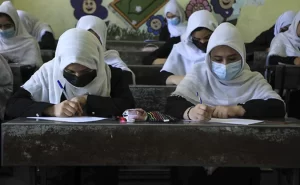
Challenges Faced by Afghan Girls as Education Faces New Restrictions
In Kabul, 13-year-old Bahara Rustam recently finished her last class at Bibi Razia School, sensing it might be the end of her education journey. Unfortunately, under the Taliban’s rule, returning to a classroom seems highly unlikely. The Taliban declared in September 2021 that girls could not pursue education beyond the sixth grade, extending this ban to universities by December 2022. Despite global criticism, the Taliban remains steadfast in their restrictions, risking international recognition.
UN special envoy Roza Otunbayeva voiced concern last week, noting that each passing day is causing a generation of Afghan girls to fall behind. In response, an official from the Education Ministry mentioned that Afghan girls can now attend religious schools, traditionally reserved for boys. However, the lack of clarity on a standardized curriculum that includes modern subjects raises questions.
For Bahara, hope persists as she studies at home, clinging to her textbooks. “Graduating from sixth grade means moving on to seventh grade,” she said, reflecting on the disappointment shared by her classmates. Unfortunately, there was no graduation ceremony at Bibi Razia School, leaving many dreams uncelebrated.
In a different part of Kabul, Setayesh Sahibzada, also 13, contemplates an uncertain future. Saddened by the abrupt end to her school days, she shares, “I can’t stand on my own two feet. I wanted to be a teacher, but now I can’t study; I can’t go to school.”
Muhammad Saleem Paigir, an analyst, warns that excluding women and girls from education could prove disastrous for Afghanistan. He emphasizes, “We understand that illiterate people can never be free and prosperous.”
The Taliban’s restrictions extend beyond education, barring women from public spaces and most jobs, confining them largely to their homes. As Afghanistan grapples with these challenges, the voices of Bahara, Setayesh, and countless others echo the urgency of addressing the educational crisis and its broader societal implications.
